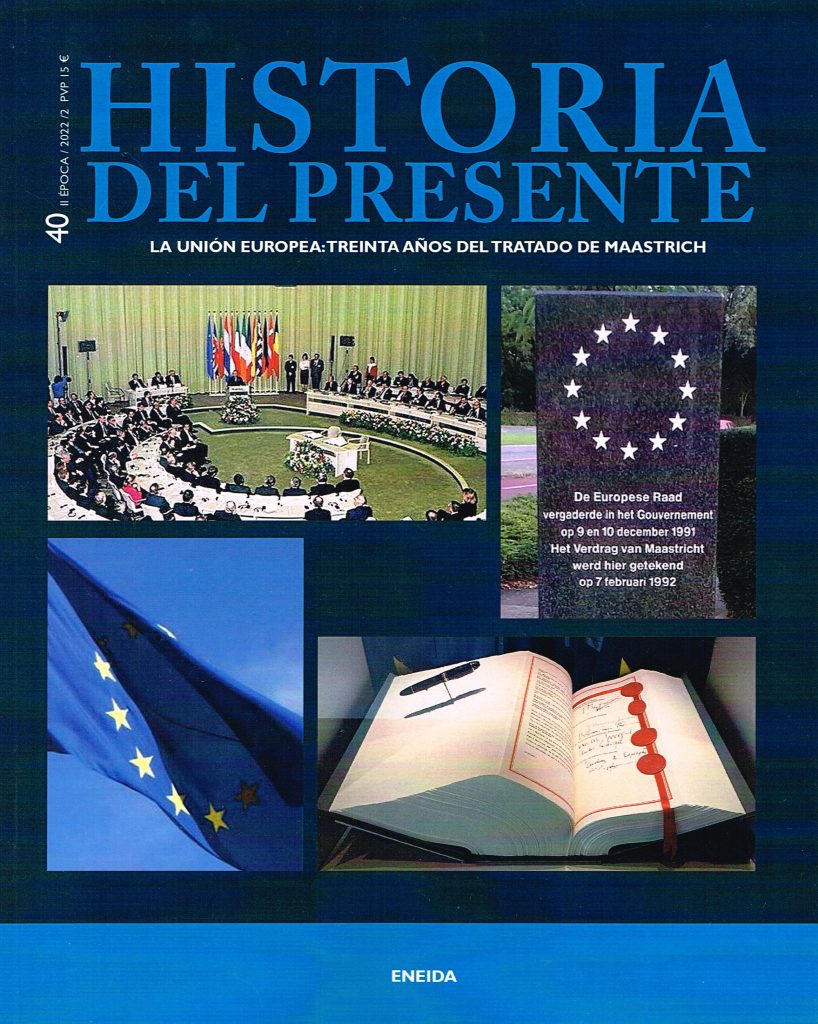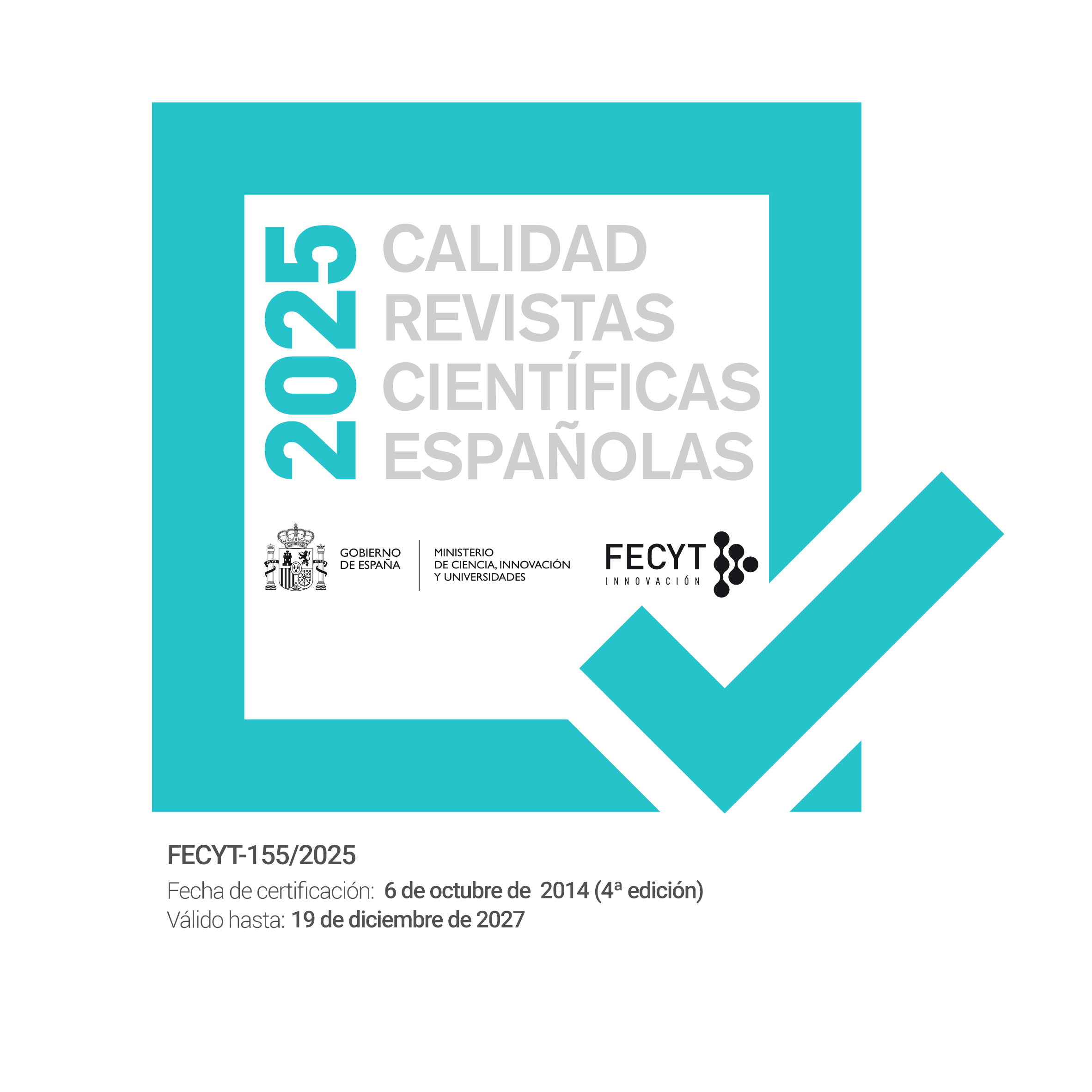Deutsche Mark Über Alles: La génesis del Tratado de Maastricht
DOI:
https://doi.org/10.5944/hdp.40.2022.39035Palabras clave:
Tratado de Maastricht, Unión Europea, eunificación alemana, Bundesbank, tipos de interésResumen
Este artículo argumenta que el vector principal que articula el tiempo y la forma en que se llevaron a cabo las negociaciones que concluyeron en el Tratado de Unión Europea de 1992 fue la agresiva política monetaria desplegada por el Bundesbank para hacer frente a las inesperadas circunstancias de la fusión de las dos repúblicas alemanas. Los proyectos de integración monetaria mencionados en las declaraciones de los órganos de dirección de las Comunidades Europeas desde 1969 no conllevaban más implicación práctica que la de redoblar la ayuda a la convergencia macroeconómica o a paliar los efectos de la persistente divergencia. No tenía por qué haber desembocado en una moneda común.
Del mismo modo, tampoco tenían los miembros de la Comunidad que responder a la unificación alemana mediante una Unión Europea. Sucedió así por la evolución del tipo de interés por parte del Bundesbank. Este requería dar respuesta, primero, al impacto inflacionario de las primeras medidas de unificación y, segundo, a la necesidad de atraer volúmenes sin precedentes de ahorro externo para financiar la reconversión de los Länder orientales. El Tratado de Maastricht fue resultado de un urgente ejercicio de soberanía compartida y no de un plan madurado durante veinte años.
Descargas
Citas
ALORDA, Marta, «Europeanisation a la carte. Negotiating Spanish accession to the European Community,1979-1985», tesis doctoral, Instituto...
ATTALI, Jacques, Chronique des années 1988-1991, tres volúmenes, París, Fayard, 1995.
BOZO, Frédéric, Mitterrand, la fin de la guerre froid etl’unification allemande : De Yalta à Maastricht, Paris,Odile Jacob, 2005.
BOZO, Frédéric, «The Failure of the Gran Design: Mitterrand’s European Confederation, 1989-1991», Contemporary European History 17/3, 2008,...
BOZO, Frédéric «In search of the Holy Grail: France and European Monetary Unification, 1984-1989», en GEHLER, Michaely LOTH, Wilfried (eds.),...
BRUNNERMEIER, Markus K.; JAMES, Harold y LANDAU,Jean-Pierre, The Europe and the Battle of Ideas,Princeton, Princeton University Press, 2016.
CARLI, Guido, Cinquant’anni di vita italiana, Roma, Laterza,1993.
CRAVERI, Piero y VARSORI, Antonio (eds.), L’Italianella costruzione europea. Un bilancio storico (1957-2007), Milán, Franco Angeli, 2009
DYSON, Kenneth y FEATHERSTONE, Kevin, The Roadto Maastricht: Negotiating Economic and Monetary Union, Oxford, Oxford University Press, 1999
DYSON, Kenneth y FEATHERSTONE, Kevin y MAES, Ivo (eds.), Architects of the Euro: Intellectualsin the Making of European Monetary Union, Oxford,Oxford...
EICHENGREEN, Barry, The European Economy since1945. Coordinated Capitalism and Beyond, Princeton,Princeton University Press, 2006.
ECUSTAT, vol. 12/1995, suplemento 2B, Luxemburgo, Oficina estadística de las Comunidades Europeas,Anexo 1 («Evolution of the EMS»).
GEHLER, Michael y LOTH, Wilfried (eds.), ReshapingEurope. Towards a Political, Economic and MonetaryUnion, 1984-1989, Nomos, Baden-Baden,...
GUALTIERI, Roberto, «L’Europa come vincolo esterno», en CRAVERI, Piero y VARSORI, Antonio (eds.),L’Italia nella costruzione europea. Un bilancio...
KOHL, Helmut, «Zehn-Punkte-Programm zur Überwindung der Teilung Deutschlands und Europas», Bulletin des Presse- und Informationsamtes der...
KOHL, Helmut Erinnerungen 1930-1982, Múnich, Knaur-Taschenbuch,2004
KOHL, Helmut Vom Mauerfall zur Wiedervereinigung: Meine Erinnerungen,Múnich, Knaur-Taschenbuch, 2009.
LOTH, Wilfried, Building Europe. A History of EuropeanUnification, Berlín, De Gruyter, 2015.
MACRON, Emmanuel, «Discours du Président dela République a l’occasion de la Conférence surl’avenir de l’Europe», https://presidence-francaise.consilium.europa.eu/fr/actualites/discours-du-president-de-la-republique-a-l-occasion-de-la-conference-sur-l-avenir-de-l-europe/.
MARSH, David, The Euro: The Battle for the New GlobalCurrency, New Haven (CT), Yale University Press,2011.
MITTERRAND, François, «Allocution de M. FrançoisMitterrand, Président de la République, a l’occasionde la présentation de ses voeux, Paris,...
MORAVCSIK, Andrew, The Choice for Europe. SocialPurpose and State Power from Messina to Maastricht,Ithaca (NY), Cornell University Press,...
MOURLON-DRUOL, Emmanuel, A Europe made ofMoney. The Emergence of the European Monetary System,Ithaca (NY), Cornell University Press, 2012.
PAMFRET, Richard, The Economic Integration of Europe,Cambridge (MA), Harvard University Press, 2021.
PÉREZ DE ARCOS, Marina, «‘Like Father, Like Son’:Willy Brandt and Felipe González: Democracy, SocialDemocracy and Internationalism in Motion...
SÁEZ ROTKO, José Manuel, «Hispania ante portas: cambio y continuidad en el posicionamiento de la República Federal de Alemania frente a la...
SAUNIER, Georges, «La négociation de Maastrichtvue de Paris», Journal of European Integration History19/1 (2013), pp. 45-65.
SCHMIDT, Helmut, A Grand Strategy for the West, NewHaven, Yale University Press, 1985
SOLANA, Javier, ‘El Tratado que nos unió’, El País, 09-04-2022.
SPOHR, Kristina, The Global Chancellor, Oxford, OxfordUniversity Press, 2016
SPOHR, Kristina Post Wall, Post Square. Rebuilding the World after 1989,Londres, Collins, 2019.
THIEMEYER, Guido, «Economic Models in Franceand Germany and the Debates on the MaastrichtTreaty», Journal of European Integration History...
TORREBLANCA, José Ignacio, «‹Con los dedos de una mano› Felipe González y Helmut Kohl: una relación especial», Papeles de la Fundación Felipe...
UNGER, Horst, A concise history of European monetaryintegration: From EPU to EMU, Westport (CT), QuorumBooks, 1997.
VOLKERY, Carsten, «The Iron Lady’s View on German Reunification ‘The Germans Are Back!», Der Spiegel,11-09-2009
WICKE, Christian, Helmut Kohl’s Quest for Normality:His Representation of the German Nation and Himself, Nueva York, Berghahn, 2015.
VARSORI, Antonio, «The Andreotti Governments andthe Maastricht Treaty: Between European Hopesand Domestic Constraints», Journal of European...
Descargas
Publicado
Cómo citar
Número
Sección
Licencia
Derechos de autor 2023 Historia del Presente

Esta obra está bajo una licencia internacional Creative Commons Atribución 4.0.
Esta obra está bajo una licencia internacional de uso: Atribución-NoComercial 4.0 Internacional https://creativecommons.org/licenses/by-nc/4.0/deed.es
Esta licencia permite a otros compartir el trabajo con un reconocimiento de la autoría del trabajo y de la publicación inicial en esta revista. Se pueden copiar, usar, difundir, transmitir y exponer públicamente, siempre que: i) se cite la autoría y la fuente original de su publicación (revista, editorial y URL de la obra); ii) no se usen para fines comerciales.









